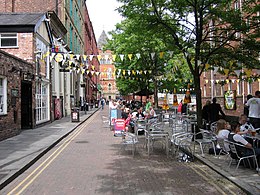Canal Street (Manchester)
 |
|
| Location | Gay Village, Manchester city centre, England |
|---|---|
| Postal code | M1 |
| Coordinates | 53°28′40″N 2°14′08.25″W / 53.47778°N 2.2356250°WCoordinates: 53°28′40″N 2°14′08.25″W / 53.47778°N 2.2356250°W |
| Construction | |
| Construction start | 1804 |
Canal Street, the centre of the Manchester Gay Village, is a street in Manchester city centre in North West England. The pedestrianised street, which runs along the west side of the Rochdale Canal, is lined with gay bars and restaurants. At night time, and in daytime in the warmer months, the street is filled with visitors, often including gay and lesbian tourists from all over the world. The northern end of the street meets Minshull Street and the southern meets Princess Street; part of the street looks across the Rochdale Canal into Sackville Park.
Canal Street developed when the Rochdale Canal was constructed in 1804, a trade artery running through the city. Pubs and other businesses evolved to service the users of the canal, especially the people stopping at the lock nearby.
Not until the 20th century, however, did the area first begin to be properly associated with gay people. By the 1960s, usage of the canal had greatly declined due to competition from other methods of transport. Whilst assuming the form of an industrial area full of cotton factories, by night the area was a red-light district. With the collapse of the cotton industry in Northern England, the area suffered urban decay. The area along the canal was perfect for gay men to meet clandestinely as it was dark and unvisited, but was near to good transport links such as Oxford Road and Piccadilly railway stations.
In the 1980s, James Anderton, Chief Constable of Greater Manchester, accused gays of "swirling in a cesspit of their own making" and, according to Beatrix Campbell, "encouraged his officers to stalk its dank alleys and expose anyone caught in a clinch, while police motorboats with spotlights cruised for gay men around the canal's locks and bridges". James Anderton, when questioned about the policing of the Canal Street area, denied that he was motivated by anti-gay prejudice and was merely enforcing the law on sexual activity in public toilets. Greater Manchester Police under his leadership ran a strict licensing regime for bars and nightclubs in the central Manchester area. Anderton retired in 1991.
...
Wikipedia
